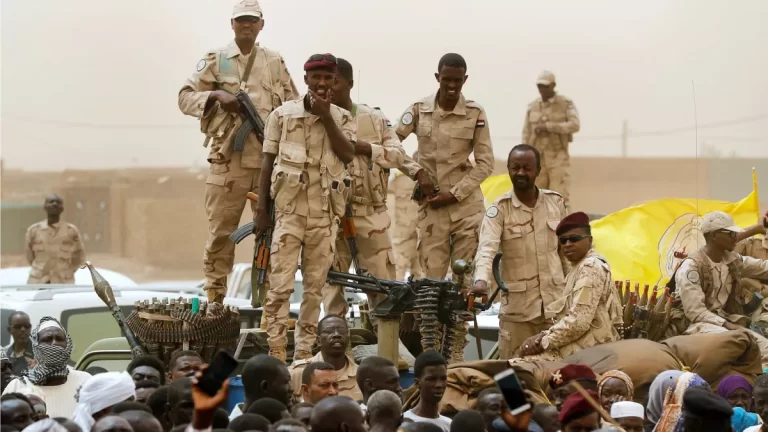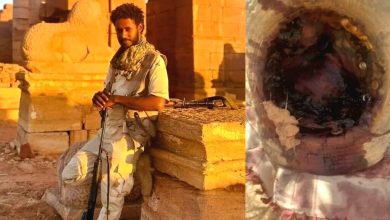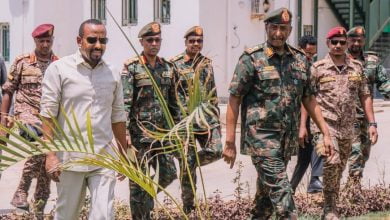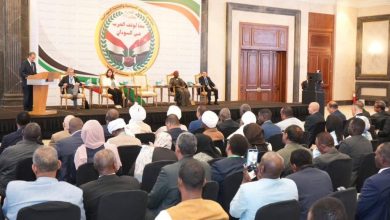When Loyalty to the Tribe Surpasses Loyalty to the Idea: Almohagig Highlights the Complete list of the “Remnants” of the RSF

Almohagig– Azmi Abdul-Razek
In its inception, it is no longer a secret that the Rapid Support Forces (RSF) militia was a product of the Inqaz (Salvation) regime. It grew and flourished under the protection of those it now calls the “Remnants” (of the previous regime) or “Kizan” (Islamists). The undeniable truth is that the first and second ranks, and possibly even the last, of the RSF were among the most extreme elements within the National Congress Party (NCP) in the states of Darfur and Kordofan. Even Hemeti himself was akin to a gatekeeper of the “Inqaz” regime in its final days, or what his political base calls the “former regime.” However, Dagalo decided, without justification, not to go down with the former regime and instead betrayed those who had brought him from the Bedouins and made him the leader of the RSF, adorning his shoulder with epaulettes!
Kill yourselves
The list of remnants of the former regime within the RSF exceeds five hundred people, including former leaders in the Popular Defense Forces, former ministers in the central government, state governors, and members of legislative councils. Most, if not all of them, hold National Congress Party membership cards, including Hemeti himself and his brother Abdul Rahim Dagalo. This makes their war against the state absurd and their disavowal of the recent past without offering a sacrifice or repentance that would at least require them to kill themselves instead of killing others.
One of the most prominent figures is Hassabo Mohammed Abdul Rahman, who held the highest positions in the state and was the vice president under former president Omar al-Bashir. The last organisational position he held was the deputy secretary-general of the Islamic Movement. However, for Hassabo, loyalty to the tribe was greater than loyalty to the idea and the political group, which is why he ended up in the arms of the militia that he had supported from behind the scenes as an advisor to Hemeti. Some leaks suggest that he was one of those who planned the coup against the state and worked secretly to make the RSF the alternative army, even including one of his sons to protect the Dagalo family’s power with tribal backing. He had previously been an official in Popular Security, as reported by several journalistic sources. He used his connections and knowledge of state secrets to carry out the plan to seize power by force successfully. However, he failed, and his betrayal was exposed, prompting the Sudanese Islamic Movement last April—after thorough investigations—to revoke his membership in the organisation, accusing him of “deviating from the principles and goals of the movement and joining the RSF militia.”
With the Against Remnants
As for Abdul Rahim Dagalo, the deputy leader of the militia, he was one of the most ardent defenders of the National Congress Party. He climbed the ranks in organisational work, serving in the student sector in South Darfur state and in the capital, Khartoum. During the famous split among the Islamists, he was closer to the Popular Congress Party led by the late Dr. Hassan al-Turabi. However, his thirst for power led him to backtrack and pledge loyalty and obedience to the ruling party. Meanwhile, Adel Dagalo, the third brother of the rebellion leader, still has his picture hanging on the walls of the Ministry of Tourism as the State Minister in one of Bashir’s last governments unless his forces, which forcibly occupied ministries and civilian properties, have hidden it to deceive people into believing they are fighting the “Kizan” (Islamists).
Without ambiguity, the militia’s investment director, Qoni Hamdan Dagalo, can be accused of being a remnant of the former regime, a charge he tried to escape by blaming others. We have an active history of his work in the student sector in South Darfur, similar to Mahmoud Wad Ahmed, the president of the Sudanese National Youth Union for the 2017 term, the penultimate term before Bashir’s regime fell. Also in memory is Fateh Qurashi, the militia’s spokesperson, who was a student cadre at West Kordofan University and the deputy secretary of organisations for the National Congress in East Darfur state before being integrated into the RSF in 2019 upon Hassabo Abdul Rahman’s recommendation.
Manufactured Extremism
Not far from this scenario is the image of Ali Majok, the advisor to the leader of the terrorist militia, who previously held the position of State Minister in the Federal Governance Chamber. Similarly, Musa Khaddam, Hemeti’s current advisor, was appointed by the late former Governor of Central Darfur, Shartay Jafar Abdul Hakim, as a presidential advisor in 2017. However, Musa, along with Ali Majok, Fateh Qurashi, and Al-Basha Tabiq, are now some of the loudest voices attacking the Islamists, which seems odd and likely serves to obscure their pasts and appease their patrons.
It might be surprising that Major General Issam al-Din Fadhel, responsible for negative phenomena in the rebel militia, was not far from the organisational base before being swept into the social base, as he recently held a winged seat in the National Congress Party’s Nomads Union.
Major General Hassan Mahjoub, the office manager of the rebellion leader, was not far from the Inqaz regime either. He was an officer in the Sudanese army seconded to work within the militia’s ranks. Before that, he was the president of the National Congress in North Darfur state and a presidential advisor. Similarly, Abshar Jibril, the office manager for Abdul Rahim Dagalo, held several organisational positions, including president of the National Congress, former commissioner of Al-Liqa locality, and a member of the National Congress’s leadership bureau in West Kordofan state. The list also includes dozens of chieftains, sheikhs, and local administration men.
Al-Basha Tabiq, the advisor to the RSF, frequently appears on satellite channels. His manufactured extremism aims to hide his previous political identity as a leader in the Popular Defense Forces in Darfur and a member of the National Congress. He was active in the corridors of the former ruling party, participating in most of the Green Marches against the Forces of Freedom and Change and the Framework Agreement, calling for Volker’s expulsion and adherence to national sovereignty. Similarly, Ali Dukhru was a member of the National Islamic Students and was responsible for the student sector in Omdurman locality, also working with the General Union of Sudanese Students. Following the same path was Ibrahim Babiker, the mobilisation officer in the rebel RSF, and Ibrahim Mudallal.
Popular Congress Wing of the Janjaweed
Some members of the Popular Congress Party have also fallen into the same murky pool as the militia. Among them are Hafez Kabir and Rabi’ Abdul-Munim, both active in the RSF media, alongside Colonel Hassan al-Turabi, the commander responsible for the al-Muqran area within the militia. His father named him after the late Sheikh Hassan Abdullah al-Turabi, but he was unworthy of the name as he chose to submit to the whims of the Dagalo family and serve the plan to fragment Sudan. The previous General Secretariat of the Popular Congress seems closer to the political line of the RSF by adopting the framework agreement and aligning with the agenda of Progress, the Janjaweed’s base. Their condemnation of the militia’s crimes in Darfur and Gezira has been low, unlike the elected General Secretariat headed by Dr. Al-Amin Mahmoud, which positioned the party correctly in history.
Money and Political Ambitions
Money played a role in buying the loyalty of Faris al-Noor, Hemeti’s advisor, a member of the negotiating delegation, and the head of the Mujahideen Organization, which was sponsored by the former Vice President Ali Osman Mohammed Taha. Political competition between Mac Abu Shutal and Malik Agar for representing the Blue Nile in power pushed the former to leap onto Hemeti’s rickety bandwagon, hoping to catch up with his arch-rival Malik Agar, who became the Vice President of the Sovereignty Council. Abu Shutal, after splitting from the Sudan People’s Liberation Movement-North, joined the National Congress until the outbreak of the war in the Blue Nile. He was in the state leadership office and the central Shura council, advising the Khartoum governor within the National Congress’s quota.
The RSF did not stop at recruiting men but also ensnared many women. Among them are Hayat Jadallah, the Women’s Secretary of the National Congress and Coordinator of the Popular Defense in Umm Rawaba locality, who is currently holding the same position for the rebel RSF in the same locality. Another is Rahma, a collector for the RSF in Sheikan locality, previously a member of the National Congress and the Islamic Movement in Sheikan, among other women who fell into the militia’s trap.
It appears that the components of the RSF are primarily governed by blood relations, marriage, and tribal affiliation, followed by categories of victims of money and personal grievances, without any ideological convictions or genuine national cause uniting these names. They raise banners and chant slogans that clash with their political journeys, inevitably leading them into contradictions that seem confusing at times, if not always.
The Islamic Movement and the National Congress Party officially chose to stand with the armed forces and defend state institutions. The movement called on its members to join the battle of dignity to defend the country and its sovereignty. Its committed members did not hesitate, disregarding the rebellion of that group and its allegiance to the terrorist militia. This withdrawal applies to them individually, indicating that blood ties outweigh ideological bonds, marking a tribal regression that undid their former strength. There is no way for them to cleanse their hands of the militia’s crimes after their membership in the political organisation was revoked. Yet, they retain the label of remnants or hold high positions in what they call the state of “56” (Sudan’s independence date). The issue, as it seems, is not about fighting Islamists but rather highlights a lack of ideological motivation. Their affiliation with the Islamic Movement was likely insincere, serving merely as a ladder to power, exploited by the planners of the UAE project in Sudan.





